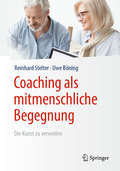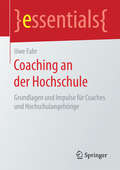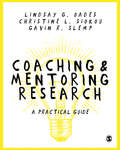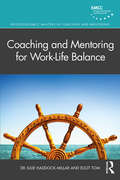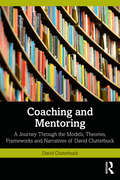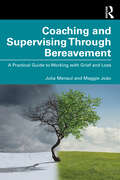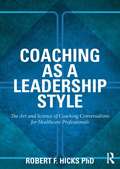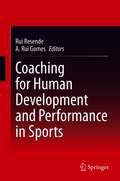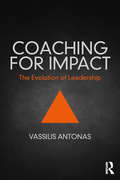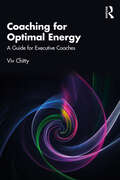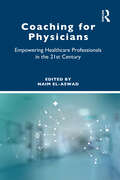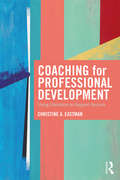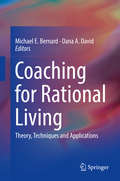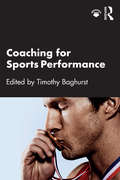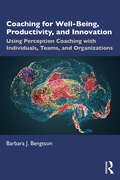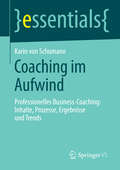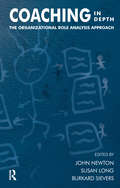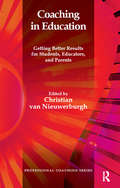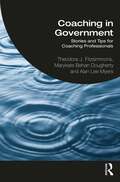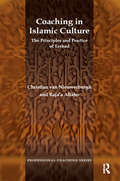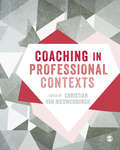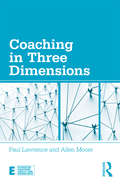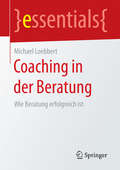- Table View
- List View
Coaching als mitmenschliche Begegnung: Die Kunst zu verweilen
by Uwe Böning Reinhard StelterDas Buch wendet sich an Professionelle, die ihre Fähigkeiten als kooperativ orientierter Gesprächspartner zu stärken wünschen. Nicht alle Gespräche sind hilfreich und nützlich für die hilfesuchende Person. Es ist wichtig, den sozialen Rahmen und organisatorischen Kontext als Hintergrund für das Gespräch zu verstehen und mit einzubeziehen, damit das Gespräch als wertvoll und sinnstiftend erlebt wird. Transformative Dialoge sind identitätsstiftend und geben dem Menschen Stabilität, Verankerung und Integrität in einer Welt, die als immer komplexer erlebt wird. Reinhard Stelter im Dialog mit Uwe Böning wollen Mut machen, Coaching und andere professionelle Dialoge nicht als bloßes Motivations- und Optimierungsinstrument zu sehen, sondern als offene und nachhaltige Begegnung zweier oder mehrerer Menschen, die Interesse haben, sich weiter zu entwickeln.
Coaching an der Hochschule: Grundlagen und Impulse für Coaches und Hochschulangehörige (essentials)
by Uwe FahrUwe Fahr gibt in diesem essential einen #65533;berblick dar#65533;ber, welchen Bedarf an Coaching Forschende und Lehrende an Hochschulen haben. Er zeigt aus der Perspektive eines Coaches auf, vor welchen Herausforderungen dieser Personenkreis steht und was es bedeutet, an einer deutschen Hochschule zu arbeiten. Praxisorientiert zeigt der Autor auf, was Coaching f#65533;r diesen Personenkreis leisten kann. Coaches erhalten Hintergrundwissen zum Coaching im Hochschulkontext.
Coaching and Mentoring Research: A Practical Guide
by Lindsay G. Oades Gavin R. Slemp Christine Leanne SiokouThis highly engaging guidebook provides an accessible introduction to research methods and the research process within the coaching and mentoring context. Starting with an introduction to the basic principles of research theory and practice, explaining why we need to do research at all, what it is, why it's important, and moving on to cover the ins and outs of actually doing research, this book provides students with everything they need to know all in one place. Packed full of case studies, activities and hints and tips for best practice, this book throws a life belt to all coaching and mentoring trainees and practitioners looking to make the best start in their research career.
Coaching and Mentoring Research: A Practical Guide
by Lindsay G. Oades Gavin R. Slemp Christine Leanne SiokouThis highly engaging guidebook provides an accessible introduction to research methods and the research process within the coaching and mentoring context. Starting with an introduction to the basic principles of research theory and practice, explaining why we need to do research at all, what it is, why it's important, and moving on to cover the ins and outs of actually doing research, this book provides students with everything they need to know all in one place. Packed full of case studies, activities and hints and tips for best practice, this book throws a life belt to all coaching and mentoring trainees and practitioners looking to make the best start in their research career.
Coaching and Mentoring for Work-Life Balance (Routledge EMCC Masters in Coaching and Mentoring)
by Julie Haddock-Millar Eliot TomThe coaching and mentoring profession is facing a major challenge – helping clients cope effectively with life’s complexities and conflicting demands in a rapidly changing environment. Conversations around work-life balance need to address not only the interconnectedness of work, leisure, home, and social life but also the fact that these elements are in flux and require continuous rebalancing. This book is a practical and evidence-based resource to help coaches and mentors in supporting clients to achieve greater work-life balance. Written by an experienced academic-practitioner team, this book provides coaches and mentors with a way of addressing work-life tensions with their clients. It is grounded in research and practice and offers a wide range of tools and techniques which are supported with real-life case studies illustrating how they can be employed. On top of this, readers are also supported with reflective questions to enhance understanding and a series of downloadable worksheets for practical use. Coaching and Mentoring for Work-Life Balance is essential reading for professional coaches and mentors who are helping their clients to develop personal resilience and will also be a valuable resource for students in postgraduate coaching and mentoring courses. The authors present some of the latest thinking on this topic, underpinned by their own research and model for work-life balance, making the book indispensable to all those engaged in leadership, coaching, mentoring, and supervision.
Coaching and Mentoring: A Journey Through the Models, Theories, Frameworks and Narratives of David Clutterbuck
by David ClutterbuckThis book represents both a milestone and a celebration. It brings together in one place all the theories and models that have emerged from the work of David Clutterbuck, one of the last surviving, first pioneers of coaching and mentoring, who has significantly helped to shape the field; and is published as his 75th book at age 75. Many of the models and approaches familiar to coaches and mentors are based in David’s prolific research, writing and practice, from Systemic Talent Management, through Team Coaching from a Complex, Adaptive Systems perspective, Personal Reflective Space, to the Diversity Awareness Ladder. In bringing more than 60 of these innovations into one volume, the book provides an invaluable contribution to the practice of coaching, and puts the evolution of coaching theory into context, tracing its development over time. This book is a one-stop-shop for coach practitioners and students to get up to speed and understand these foundational models. This book will appeal to coaches and HR professionals across the world, at all levels.
Coaching and Supervising Through Bereavement: A Practical Guide to Working with Grief and Loss
by Julia Menaul Maggie JoãoThis book presents a pragmatic guide for coaches and supervisors working with grief and bereavement, providing both useful case studies and practical techniques to aid professionals in embracing the complexity of working with these topics in a coaching context. Coaching and Supervising Through Bereavement clearly delineates the boundary between bereavement issues requiring specialist counselling and 'normal' bereavement topics within coaching. It addresses how to coach clients through all different forms of bereavement, not just through death but also other losses such as job loss and relationship loss, and enables coaches to shine a light on their own bereavement journeys for the benefits of themselves and their clients. The authors also offer a guide for coaching supervisors to aid the ethical and emotional support required for their own supervisees and themselves. This book debunks the myth that bereavement should not be discussed in coaching, and so will be a valuable resource for any practicing coach or supervisor of all levels of experience or expertise.
Coaching as a Leadership Style: The Art and Science of Coaching Conversations for Healthcare Professionals
by Robert F. Hicks, PhD.The healthcare environment is in flux. On the one hand, doctors are being driven into ever larger group practices by increasing regulatory and administrative burdens and the need for greater negotiating power. At the same time, growing infrastructure costs and the threat of payment reform is pushing them into closer alignment with hospital systems. This rapidly changing environment requires a more sophisticated set of leadership skills. This book introduces a unique and practical coaching style as a way of interacting with colleagues, managing direct-reports, helping others solve problems, responding to change, making effective choices and developing professionally. It draws from four evidence-based models for interacting with others and facilitating change - solution-focused therapy, cognitive-behavioral therapy, motivational interviewing, and transactional analysis – and reframes them so that they are congruent with managerial and leadership terminology and provide a practical set of methods and tools for today’s healthcare leader.
Coaching for Human Development and Performance in Sports
by Rui Resende A. Rui GomesThis book addresses important topics of coaching in order to better understand what sports coaching is and the challenges that arise when assuming this activity. It provides the reader with useful insights to the field of sports coaching, and discusses topics such as coaching education, areas of intervention, and main challenges. With contributions by experts and well-known authors in the field, this volume presents an up-to-date picture of the scholarship in the coaching field. It introduces key aspects on the future of the science of coaching and provides coach educators, researchers, faculty, and students with new perspectives on topics within the field to help improve their coaching effectiveness.
Coaching for Impact: The Evolution of Leadership
by Vassilis AntonasThe world is changing. The first century of the third millennium has seen exponential growth and advancement in almost all areas, and makes the last century of the second millennium look like a rusty old steam train by comparison. The ‘digital revolution’ is no longer a revolution. Practically anyone can publicise their outlook, whilst having access to a wealth of information at the click of a button. And this levels out the playing field in an unprecedented and unpredictable way. So how can anyone stand out? How can anyone gain a competitive advantage? How can anyone master more influence? How can anyone lead? The answer lies in coaching: a discipline that enhances performance by generating meaning through the art of relating. In Coaching for Impact, Vassilis Antonas brings together his dual expertise in executive coaching and psychotherapy to present a transformative, evolutionary approach. The book examines methodology, presence and fundamental skills and includes a new, innovative model of leadership. Antonas also uses Jungian concepts to address the coach’s internal disposition, supporting their evolution and transformation. Coaching for Impact equips trainee and beginner coaches with an A to Z of executive coaching and engages seasoned practitioners to an uncompromised pursuit of excellence by pushing the boundaries of leadership coaching. It will appeal to executive and leadership coaches at all levels, including those in training.
Coaching for Optimal Energy: A Guide for Executive Coaches
by Viv ChittyA completely new way of considering energy in executive coaching, the concept of ‘optimal energy’ is based on original research. This fresh insight and its application is a fundamental new approach for use in executive coaching. Suboptimal energy levels in senior executives, although rarely considered, can negatively impact efficacy, feelings, behaviour and self-awareness both at work and in coaching sessions. But what is optimal energy? This needs to be addressed by executive coaches, but how? Coaching for Optimal Energy: A Guide for Executive Coaches answers these questions and challenges previous thinking on the subject. Written for executive coaches, and appropriate for anyone who works with people, for the first time in coaching literature the book gives a research-based definition of the concept of energy and examines how energy manifests in clients, analyses the influences on energy and offers clear guidance and practical ideas for addressing energy with clients. This is an essential new resource for coaches and other practitioners who want to effectively address energy and enable clients to take action to optimise their energy in their daily lives.
Coaching for Physicians: Empowering Healthcare Professionals in the 21st Century
by Naim El-Aswad, MD, FACP, ACCThis edited collection brings together leading voices in the field of medicine and coaching to highlight the growing challenges healthcare professionals face today, providing practical coaching tools and approaches to empower physicians to not only survive but thrive in the 21st century. Combining the knowledge of two professions, healthcare and coaching, the contributors offer a detailed analysis and discussion of the growing issues in the healthcare industry, demonstrating how coaching principles can be implemented to help improve physician leadership, well-being, performance, personal and professional happiness, and positive patient outcomes. Chapters address key topics such as burnout, resilience, emotional intelligence, career coaching, team coaching, and best practice approaches when working with the unique challenges of coaching physicians. Filled with case studies, definitions, summaries, and key points throughout, this book provides solutions to manage the surmounting challenges we are seeing in healthcare across the world today. This book is essential reading for all coaches working with physicians, healthcare executives, nurses, and allied health professionals.
Coaching for Professional Development: Using literature to support success
by Christine A. EastmanCoaching has emerged as one of the most significant aids in developing managers and executives in the professional world. Yet there is a degree of dissatisfaction with performance coaching models and a desire to connect more with creativity and the imagination. In Coaching for Professional Development: Using Literature to Support Success, Christine A. Eastman suggests that literary works have a part to play in bringing about a change in coaching culture. Using a series of examples from key literary texts, she argues that literature can help coaches enhance their skills, find solutions to workplace problems, and better articulate their own ideas through innovation and imagination. Eastman argues for literature as a coaching tool, detailing how using stories of loss, failure, alienation and human suffering in a coaching dialogue bring positive results to organisational coaching. Coaching for Professional Development considers how reading fiction helps us to imagine lives outside our own, and how this sensitivity of language brings out the unconscious within us and others. Eastman discusses how she guided her students to embrace literature as a positive influence on their coaching practice through literary texts. Chapter 1 begins by exploring how reading Melville’s Bartleby the Scrivener allowed her students to understand the importance of metaphor in their own coaching, with Chapter 2 illuminating how Cather’s Neighbor Rosicky addresses the role of emotion. After this, Eastman considers how John Cheever’s multi-layered story The Swimmer provides rich stimulus for coaching students in understanding failure, how Miller’s Death of a Salesman shows how our family relationships are reflected in our office dynamics, and how the reactions of her students engaging with Lampedusa’s The Leopard are more effective than the traditional coaching tool, Personalisis, in revealing their personality. She finally looks at Shakespeare’s The Tempest for exploring themes of power and manipulation in a coaching context. By applying coaching models to fictional scenarios, Eastman demonstrates that coaches, HR professionals and students can successfully extend the boundaries of their coaching, strengthen their interventions and enhance their understanding of theory. Coaching for Professional Development: Using Literature to Support Success is a unique approach to coaching with engaging case studies throughout that brings together higher education and industry. It will be key reading for coaches in practice and in training who wish to enhance creativity in their work, advisors and teachers on coaching courses, and HR and L&D professionals working in organizations seeking to implement a coaching culture.
Coaching for Rational Living: Theory, Techniques and Applications
by Michael E. Bernard Oana A. DavidThis eminently useful guide presents an up-to-date framework for Rational-Emotive Cognitive-Behavioral Coaching (RE-CBC), from basic concepts, techniques, and applications to evidence of how and why this versatile method works. It details how RE-CBC synthesizes the rational thinking, cognitive disputing, and semantic training traditions of RE and CB therapies into coaching strategies for solving problems or furthering personal development. The book’s sections on process and techniques demonstrate the flexibility of the method as used in a variety of settings toward a gamut of purposes, illustrating Albert Ellis’ central goal of long-term happiness through rational living. And specialized chapters offer applications of RE-CBC to familiar coaching domains (life, health, family, motivation) as well as to the complex worlds of business and organizations. Included in the coverage: · Coaching for rational living: rational-emotive, cognitive-behavioral perspectives. · Psychological blockers to successful coaching outcomes. · Enhancing positive psychology coaching practice. · Assessment, case formulation, and intervention models. · A step-based framework for coaching practice. · Plus: applications of Rational-Emotive Cognitive-Behavioral Coaching, including motivational, parent/family, workplace stress management, organizational change, school success, and sports performance. Coaching for Rational Living is a robust practice-building resource for coaches, psychologists, counselors, and health professionals, particularly mental health practitioners who use rational-emotive and cognitive-behavioral therapy and coaching.
Coaching for Sports Performance
by AminCoaching for Sports Performance provides a practical overview of the many disciplines necessary to be an effective coach. Using experts from across the sports science fields, this book teaches readers the core concepts in a practical, easy to understand style, separated into four sections. Part I explains the fundamentals of effective coaching including the development of coaching philosophies, best practices for coaching effectively, how athletic technique matures, and what coaches can and cannot do in specific health-related situations. Part II provides practical ways to improve athletic performance where readers learn the fundamentals of biomechanics and how to use technology to analyze performance, the physiological functions and adaptations to exercise, how the body can be physically trained and properly fueled, and mental strategies to optimize athletic outcomes. Part III introduces the business side of coaching, the important responsibilities involved in sport management, and practical methods for marketing as well as working with the media. Last, Part IV offers specific strategies for coaching across age and skill levels. Chapters are split into youth and high school, collegiate, and professional athletes, and the nuances of coaching each level are explained. Being called "Coach" is an honor, but with this title comes the responsibility of being professional, knowledgeable, and effective. Coaching for Sports Performance provides the platform for becoming a successful coach and assisting athletes in achieving their potential. Coaching for Sports Performance provides a practical overview of the many disciplines necessary to be an effective coach.
Coaching for Well-Being, Productivity, and Innovation: Using Perception Coaching with Individuals, Teams, and Organizations
by Barbara J. BengtsonThis book presents Perception Coaching® as a model that enables coaches to support their clients in understanding the impact of their attitudes in themselves, helping individuals, teams, and organizations reduce their inherent biases to more effectively collaborate, innovate, and support each other. Dr. Bengtson approaches coaching through the lens of educational psychology in three parts, starting with understanding self and others, moving on to interactions and teams, and finally culture and organizations. Filled with strategies throughout, the book focuses on examining natural patterns of thinking and acting to uncover perceptual filters so that the unexamined and unexplained may be brought to light and understood. Covering topics such as emotional intelligence and communication styles, the book aims to help coaches support their clients pursue purpose, increase inclusion, and create innovation. This book is invaluable reading for current and aspiring coaches and non-profit and corporate leaders, as well as talent development professionals.
Coaching im Aufwind: Professionelles Business-Coaching: Inhalte, Prozesse, Ergebnisse und Trends (essentials)
by Karin SchumannCoaching, die psychologisch orientierte Einzelberatung von Führungskräften, gilt als wachstumsstärkstes Personalentwicklungsinstrument und wird zur gezielten Förderung von Leistungs- und Potentialträgern eingesetzt. Der Coachingprozess lässt sich in typische Phasen unterteilen, die von der Bedarfsermittlung und Coachauswahl über Auftragsklärung und die einzelnen Coachingsitzungen bis zur Evaluation und Erfolgskontrolle reichen. Im Businesscoaching ist der systemische Ansatz weit verbreitet und akzeptiert, weil er das organisationale System eines Unternehmens ganzheitlich erfasst. Studienergebnisse weisen darauf hin, dass die Beziehung zwischen Coach und Coachee für den Erfolg von Coaching von zentraler Bedeutung ist. Zielspezifität und -konkretisierung tragen ebenfalls signifikant zum Coachingerfolg bei.
Coaching in Depth: The Organizational Role Analysis Approach
by John Newton Susan Long Burkard SieversCoaching In Depth introduces the reader to the management consultancy technique of Organizational Role Analysis (ORA); a technique with the immensely practical purpose of helping managers to stay "in role and on task". The ORA method is grounded in a process of consultation that derives from the conjunction of open systems theory and psychodynamic understandings of human behaviour. It enables the collaborative resolution of the mental and emotional tensions represented in the client's work role as he/she strives to manage the dynamics between their organization-in-the-mind and the organization-in-reality.
Coaching in Education: Getting Better Results for Students, Educators, and Parents (The\professional Coaching Ser.)
by Christian Van NieuwerburghCoaching in Education: Getting Better Results for Students, Educators and Parents will support educational organisations in learning more about the current interest in coaching approaches within schools, colleges and universities. With chapters on coaching in primary schools and secondary schools, with students, staff and parents, this book provides a sound basis for introducing coaching into any educational setting. This book brings together the latest national and international academic research with real case studies and a focus on practice that makes a difference for learners. Starting with a review of the existing literature and research into the area of coaching in education, the book goes on to consider the role of coaching educational leaders, coaching within the primary school setting and then secondary school settings. The notion of "mental toughness" and its relationship to coaching is also explored. The US and Australian perspectives on coaching in education are discussed in two chapters written by leading experts - instructional coaching in the US and the integration of positive and coaching psychology in Australia.
Coaching in Government: Stories and Tips for Coaching Professionals
by Theodora J. Fitzsimmons Marykate Behan Dougherty Alan Lee MyersThis book captures the story of how internal coaching was introduced and has since evolved in the U.S. Federal Government. It provides coaches and government agency leaders with skills and tools to help them implement their own successful coaching programs. Written by leaders in the field, the book follows the stories of several pioneers who have implemented coaching programs in government, aiming to help coaches learn from their mistakes and gain from their wisdom. Filled with interviews, case studies, reflective questions, and how-to action points, each chapter accessibly highlights the successes and failures of each program's journey so that professionals can incorporate these lessons in their own practice. Chapters take readers from the beginning considerations to contemplating the future of their programs, focusing on setting a vision, overcoming issues and challenges, leveraging predictors of success, making key decisions, building foundations for sustainability, and creating continuing education for sustainment of change. Accessible and relatable, these stories will help professionals learn from those that have come before them, helping them begin the groundswell of change effectively and proactively in their own programs. This book is essential reading for coaches and government agency leaders, as well as for any public sector agency and any private sector organization that is interested in implementing coaching.
Coaching in Islamic Culture: The Principles and Practice of Ershad (Professional Coaching Ser.)
by Raja'a AllahoThis book is the result of a collaboration between two authors who share a passion and commitment for coaching. Its aim is to enthuse readers and provide guidance about the appropriate use of coaching within Islamic culture. The intention is to provide a culturally relevant coaching framework for use in Islamic context, which allows Muslims to develop in ways that are aligned with their faith and traditions. The complete coaching framework presented here is called Ershad.
Coaching in Professional Contexts
by Dr Christian Van NieuwerburghHave your students mastered the underlining theory and skills of coaching practice but wanting to get a flavour of what coaching actually looks like in different real-life settings? Then you have come to the right place! Whether they are wanting to find out more about the use of coaching within the private or public sector, within health care or education, Christian van Nieuwerburgh and his team of expert authors will take them on a unique journey into all of these coaching contexts and beyond. Challenging the idea that a coach can work in any setting without a detailed understanding of the field, this book: addresses the importance of understanding professional context when coaching, exploring current debates and considering the hows and whys of using coaching in a certain context provides tools and knowledge to enable readers to adopt best practice techniques from a range of fields delves into the personal and professional challenges that will inevitably arise. Whether a practising coach or a coach in training, this practical guide will provide your students with the ideal 'way-in' to all the different contexts in which they may wish to coach.
Coaching in Professional Contexts
by Dr Christian Van NieuwerburghHave your students mastered the underlining theory and skills of coaching practice but wanting to get a flavour of what coaching actually looks like in different real-life settings? Then you have come to the right place! Whether they are wanting to find out more about the use of coaching within the private or public sector, within health care or education, Christian van Nieuwerburgh and his team of expert authors will take them on a unique journey into all of these coaching contexts and beyond. Challenging the idea that a coach can work in any setting without a detailed understanding of the field, this book: - addresses the importance of understanding professional context when coaching, exploring current debates and considering the hows and whys of using coaching in a certain context - provides tools and knowledge to enable readers to adopt best practice techniques from a range of fields - delves into the personal and professional challenges that will inevitably arise. Whether a practising coach or a coach in training, this practical guide will provide your students with the ideal 'way-in' to all the different contexts in which they may wish to coach.
Coaching in Three Dimensions: Meeting the Challenges of a Complex World (Essential Coaching Skills and Knowledge)
by Paul Lawrence Allen MooreTraditional approaches to coaching fail to account for the way organizations really work. Attempts to enhance leadership capability one person at a time, through private one-to-one coaching sessions, are unlikely to succeed by themselves. Coaching in Three Dimensions: Meeting the Challenges of a Complex World offers a more connected, systemic approach, aligning coaching with the realities and challenges of organizations operating in an ever more complex world. Coaching in Three Dimensions is structured around a central model: the three dimensions of coaching. Using stories and case studies, the book enables readers to: Consider their current and desired approach to coaching: is it traditional, dialogic, or systemic? Identify which areas of practice they work in and wish to work in: one-to-one coaching, group/team coaching, and/or organizational coaching? Think about stretching their development as a coach in terms of competence, capability, and perspective: how do you enhance your capacity to manage the challenges of increasing complexity? The book explains complexity using simple language and easy-to-recognize examples, and suggests pragmatic approaches going forwards. Coaches will learn how to expand their scope and impact, and to navigate the new and difficult challenges posed by contemporary businesses. Clients wishing to use coaching in complex change work will learn what to look out for in prospective coaches and how to best deploy them in their organizations. Coaching in Three Dimensions will appeal greatly to all coaches, including those working with organisations, students and those in training, as well as HR and OD professionals and senior leaders.
Coaching in der Beratung: Wie Beratung erfolgreich ist (essentials)
by Michael LoebbertMichael Loebbert gibt in diesem essential eine kompakte Einf#65533;hrung in das Verh#65533;ltnis von Coaching und Beratung. Formen und Fragestellungen von Coaching und Supervision f#65533;r Beratung werden systematisch dazu in Beziehung gesetzt. Zudem gibt der Autor einen Ausblick auf die Zukunft des Beratens. Coaching ist darin sowohl Erg#65533;nzung als auch Innovation herk#65533;mmlicher Vorstellungen von Beratung.
